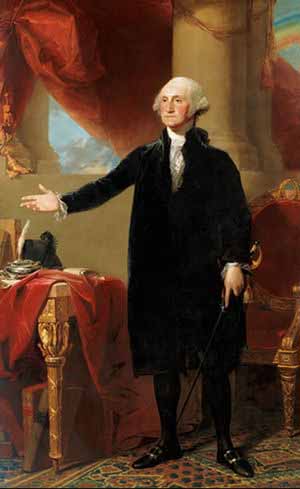
Having just attended my first Nationals game of the season, I am inspired to write more before this week’s busy-ness starts. Although I may have to write a blog post about the Orioles this season who it seems are shooting for the worst record in baseball history, ay yi yi… Anyway, the Presidents posts continue! This time we resume with the plump, brash, outspoken, and often frustrated Mr. Adams, our 2nd President.
Sit down John, for God’s Sake John, Sit down! (From the musical 1776, feat. Mr Feeney)
John Adams was born on October 30, 1735 in Quincy, Massachusetts, just a hop, skip, and a jump from Boston. His family had emigrated from Wales and England in 1638, making his family one of the oldest in the Massachusetts Bay Colony. This is something that Adams took very seriously as he sought to uphold his family’s heritage. He attended Harvard College, graduating in 1755, and then decided to become a lawyer and was admitted to the bar in 1758. A few years later, in 1764 he married Abigail Smith, who bore him 5 children, including future POTUS John Quincy Adams.
While Adams was never as popular as his cousin Sam Adams (who obviously was famous enough to have a brewery named for him), John was often outspoken and his approach was unyielding. Both were fervent patriots and gained reputations as such in Massachusetts. However, as a man of principle, Adams served as the defense counsel for the British soldiers who shot and killed several Americans during the Boston Massacre in 1770. I too was surprised when I first read about this, but not only did Adams take a bold stance by defending the wildly unpopular soldiers, he was paid only pennies for his services. LAME!
A few years later, Massachusetts sent John Adams to the 1st and 2nd Continental Congresses where he made a name for himself as an outspoken critic of King George III and a diehard patriot for independence (in fact it was Adams who nominated Washington to be commander-in-chief of the Continental Army). Something to remember about these first Congresses was that they did not assemble for the purpose of declaring independence. There were still many loyalists who attended these Congresses fully expecting to reconcile differences with Great Britain but who wished to remain under English rule. This is why Adams’s passionate support for independence was so critical in swaying votes among its skeptics.
So long story short, the Declaration of Independence was written by Jefferson under Adams’s supervision, we won the war, and Adams assumed a new role- diplomat. During the final years of the war and under the Articles of Confederation, Adams was in Europe, in France to solicit support for the American cause, in Britain to negotiate terms of surrender and smooth a transition, and finally to Amsterdam, Netherlands attempting to secure loans for the infant nation. He returned to America under the new Constitution as the country’s first Vice President under Washington.
One of my favorite Adams quotes is his opinion on the position of VP, "My country has in its wisdom contrived for me the most insignificant office that ever the invention of man contrived or his imagination conceived." Adams had a weak case of little man’s complex where he envisioned himself to be the wisest of his colleagues, and was very aware that his ego and intellect weren’t being used to their potential. This is why Adams was narrowly elected to succeed Washington (big shoes to fill) as the country’s 2nd President.
The Adams administration had one big success, preventing an escalating conflict with France, and several huge blemishes. The biggest being the Alien and Sedition Acts, which legalized the incarceration of any citizen who talked smack about the government and required a longer period of residence for an immigrant to become a U.S. citizen. This was done to prevent the registration of immigrants with Jefferson’s growing Democratic-Republican Party. These acts were extremely unpopular and were eventually repealed. Adams was also the first President to reside in the White House. When he arrived, he and Abigail were shocked to find hundreds of black slaves constructing their future home. As a lifelong New Englander, slavery was something that Adams resented and opposed his entire career.
The election of 1800 saw the election of Thomas Jefferson, by this point Adams’s bitter enemy, to succeed him after one term. Adams so resented his former colleague that he skipped town

and left for Massachusetts before Jefferson’s inauguration, but not before appointing several last minute (midnight) appointments to the Supreme Court, which became the thorn in Jefferson’s side during his presidency. John and Abigail lived a long life together on their farm in Massachusetts, and John even lived to see his son elected president in 1824. Adams died on July 4, 1826, 2 hours after Jefferson, at the ripe old age of 90 years and 247 days (beaten only by Reagan and Gerald Ford).
One of the reasons we know the most about John Adams and his contemporaries is through Adams’s extensive letters, especially to his wife Abigail, who, while Adams was despised by many of his colleagues, remained truly in love and supportive of her husband. Their letters represent one of the most passionate and affectionate love stories of the time and tell a lot about Adams’s true feelings and constant frustration. Adams’s letters with Jefferson, particularly after their reconciliation later in life are also fascinating.
Next up, everyone’s favorite, Thomas Jefferson.


